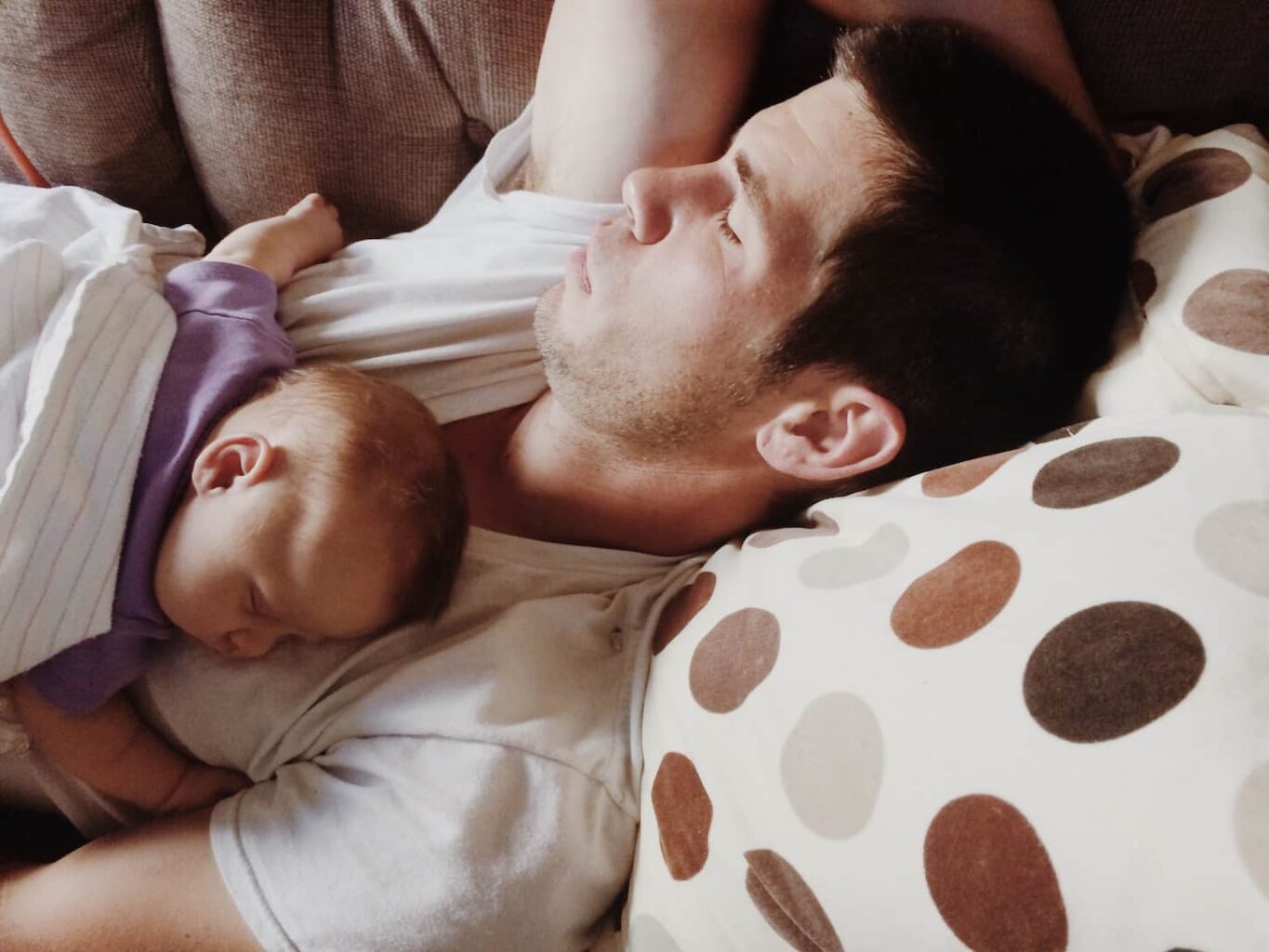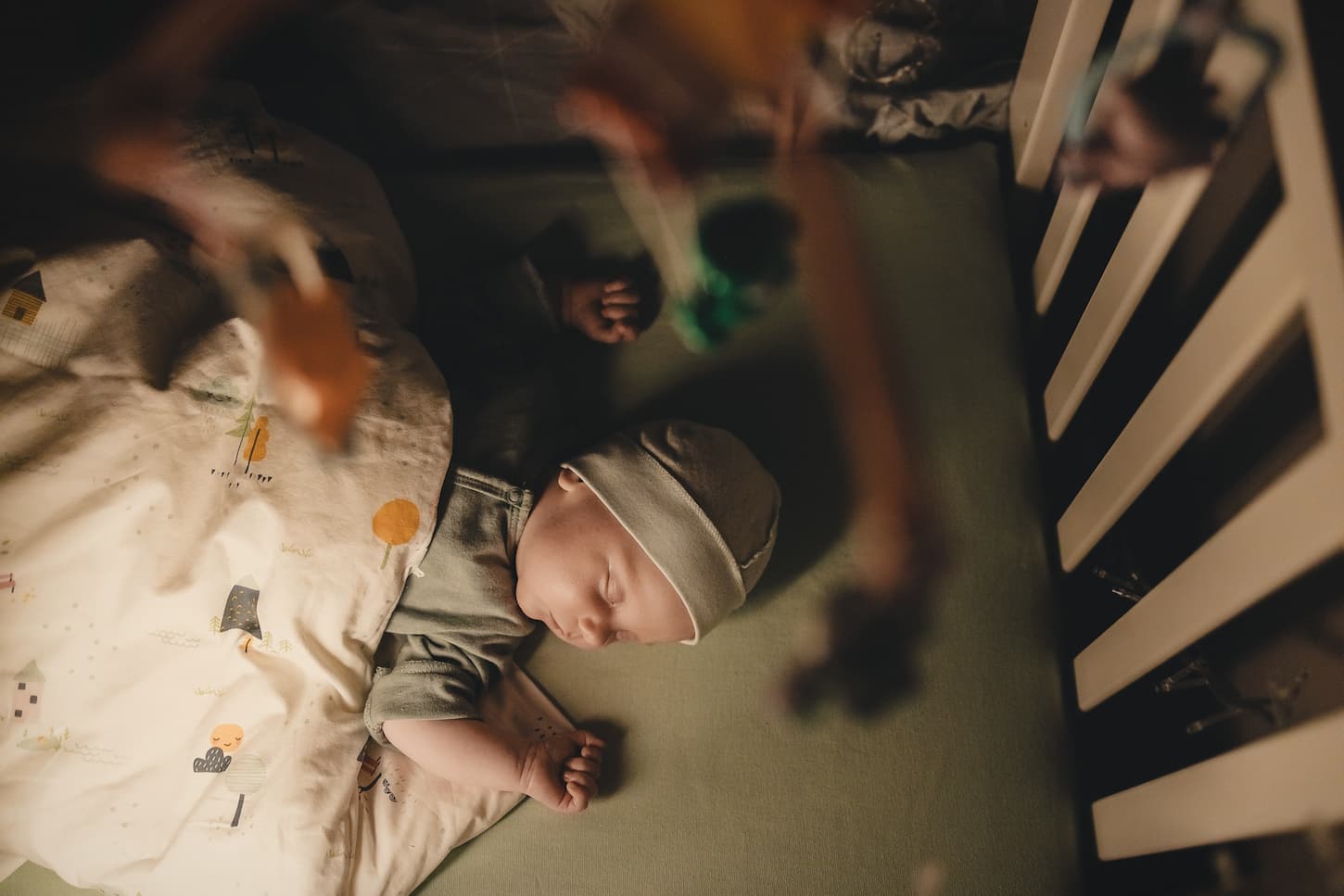Whether you’re sleep training or not, dealing with way-too-early mornings is difficult at best. And now that you’re up too early, too, you’re probably wondering what you can do about these early morning wake-up calls.
Helping your child learn to wake up at a regular, reliable time each day takes patience, practice, and time. It also requires that you treat too-early wake-ups like you would a night waking. Keep the room dark, quiet, and sleep-focused until the set wake-up time.
After extensive research (and surviving countless too-early mornings) here are the best 20 tips to help you make the transition to on-time wake-ups easier.

Paradoxical Sleep Deprivation is the Answer to “Why Does My Baby Wake Up So Early?”
Why does your baby wake up so early? Well, the most usual reason is counterintuitive.
Your baby is overtired and exhausted – and so they’re far more likely to wake up at the end of a normal sleep cycle. But because they’re sleep-deprived, it’s harder for them to fall back asleep.
So, they wake up early. Far too early.
The best way to fix this paradoxical (or counterintuitive) sleep deprivation is to move bedtime earlier (by about 15-30 minutes) for a few nights in a row.
It’s crazy but simple – and over the course of a few days, it will work some serious sleep magic. I didn’t believe it at first with our oldest child – but now it’s one of our go-to fixes for almost every sleep issue. And it fixes the too-early wakings.
Check Your Expectations: “Realistically, What Time Should My Baby Wake Up in the Morning?”
When I talk to parents about too-early wake-up times, one of the first questions I ask them is this: “What time is your baby waking up?”
Most babies are going to wake up between about 6 to 7 AM and that’s a totally realistic and normal expectation.
The reason for that is this: waking up between 6-7 AM is very normal for many babies. It’s not an ideal wake-up time for many parents, especially if they work late. But it is a normal wake-up time and in line with most people’s circadian rhythms.
So if you’re hoping to get your baby to sleep past 6-7 AM, know that it may not happen. There are certainly those babies who prefer sleeping in and staying up late, that’s true! Just as there are adults who prefer that schedule – and their natural sleep-wake cycles support it.
However, if your baby is waking up anywhere from 3-5:30 AM, that may be too early. It’s especially too early if they can’t maintain a happy, playful behavior for more than a few minutes. That means they’re probably still tired or even exhausted. And we can work on that.
Hidden or Underlying Medical Concerns Have to be Addressed
Just because you can’t see something doesn’t mean it’s there. It could be hidden or hard to find – or you could be just missing it. (It could be kind of like when you ask someone to grab you something from the fridge – it’s right there but they can’t seem to find it!)
Some hidden or underlying medical concerns can be like that – they’re hard to see. That’s why pediatricians ask so many screening questions at check-ups. They’re trying to help find these issues.
Or, if your parental intuition says something is wrong (and you’re not sure what it is), go ahead and talk to your doctor about it. Talk to them about it as often as you need to until you both feel like things have been adequately resolved.
Sometimes the underlying concern may just end up being related to anxiety or stress. Or maybe your parental intuition will help you catch something serious. Whatever the case, listen to that intuition and follow your gut instinct.
Then, make sure those underlying concerns are addressed. And, if need be, use that new knowledge to adjust your sleep training plan – so that everyone can get back to sleeping already.

Know Everyone’s Role in Sleep Training.
A lot of people ask this question: How do I stop my baby from waking up so early?
Your role isn’t to make your baby do anything or stop them from doing anything. In fact, you can’t make them do or not do anything.
There’s a division of responsibility in parenting – and in sleep. Ready for it?
| Parental Responsibilities | Child’s Responsibility | |
|---|---|---|
| When to Sleep | The parent chooses when bedtime is. | The baby chooses if they fall asleep. |
| Where to sleep | Parents get to choose where the baby sleeps, at least until the baby becomes mobile and/or an escape artist. | Baby gets to choose whether they throw a fit about it. And once they’re mobile, they’re going to have more say in this! |
| How long to sleep | Parents can help babies sleep longer by adjusting the when and where to sleep. | The Baby’s circadian rhythm is in charge here. |
While it can be hard to realize that you can’t “make” your child do anything, it’s also kind of liberating to realize that the only things you can impact are when and where your baby sleeps – and even that responsibility will change as the child grows.
However, you can help your child adjust “how long” they sleep by adjusting the bedtime – to help ensure they get enough adequate sleep so that they can keep sleeping as long as their body needs it.
Be Patient, Be Consistent, and Give it Time.
This is a hard tip, but it’s a vital one. Sleep training isn’t an immediate thing. It’s a process – and it can be a slow one. Granted, the initial steps can be a lot faster for some children (depending on their personality and the sleep training method you choose).
But for most people, even an initial cry-it-out style sleep training session won’t be the only time you ever have to address sleep in your home. It would be nice, but it’s not how things usually go.
Instead, you’re going to be teaching your child to protect, value, and get enough sleep while they grow. That’s what sleep training is really like – and it’s a lasting, changing process.
So stop seeing sleep training as a one-and-done thing. Instead, think of it as a learning process for everyone – kind of like teaching your children any other skill they’ll need to acquire to become mature, functional, and independent adults.
Control Your Anxiety about Sleep or Lose Control of Sleep
Here’s a hard truth about parenting: our children can sense our anxieties and reflect them, even as babies.
So if we’re stressed and anxious about how much sleep they are (or aren’t) getting, then they’re going to feel it. They’ll become stressed and anxious. And then they’ll have a lot harder time sleeping, too.
So take five minutes to calm down and control your own fears, anxieties, and stresses. That way, your baby will be able to sense and reflect your calmness. Then, they’ll be able to sleep easier and faster.
It’s a crazy simple fact – and yet oh-so-hard to master. And this isn’t just a truth about sleep – it’s something that can be said about parenting in general.
With our kids, the more I stress about what my picky eaters will (or won’t) eat, the more stress my kids experience about eating. And that means they try fewer foods. So I’m working on controlling that fear – and as a result, my kids are less stressed at meals.

Developmental Milestones May Cause a Few Early Mornings
As your baby grows, new developmental milestones (like learning to sit, stand, and examine toys) are a lot of fun to watch. These milestones, however, can cause a few too-early mornings as your baby discovers that it’s much more fun to play than it is to sleep.
Now, that doesn’t mean that you need to immediately remove all of the toys from the crib. It does mean rethinking what’s in there, though. Because while having a special toy or blankie in there can provide comfort, having an entire set of blocks may prove too tempting for your child.
Even so, just expect a few rough mornings while your baby is growing. It’s normal and things do resolve.
Treat Too-Early Wakings like a Night Waking
Babies are cute, but the world is still very simple for them. They understand things like day and night. But dusk and dawn? Well, that concept may take some time yet. And that’s okay.
So if it isn’t their daytime, go ahead and treat it like nighttime. Too-early wakings, if it isn’t daytime yet, should be treated as night waking.
If the too-early wake-up gets you up too close to the usual wake-up time, feel free to get creative with your schedule. Consider getting up early for a while, or at least until your baby settles back into the preferred schedule.
Our third boy wanted to wake up at 5 AM every day. That waking time lasted almost a month – and it was HARD to treat as a night waking because it was so close to my own 6 AM wake-up. I ended up moving my days to start after helping him – and used that transition month to get into better shape.
Check for a “Wakefulness Window”
Sleep Regressions May Manifest as too-early Wake Ups
Some of those developmental milestones (like learning to stand and walk) may be disruptive enough at night that it triggers a full sleep regression. And one way that sleep regressions may manifest is in too-early mornings.
Your baby may be so excited to practice standing (what an amazing new skill, right?) that they wake up early, pull themselves to stand, and then they’re stuck.
Okay, they’re not entirely stuck. But they’re standing, they’re tired, and it’s far easier to call for someone to rescue them than it is to fix things themselves. Or at least that’s how it seemed when my kids did it!
In any case, sleep regressions can be a cause of too-early mornings. Thankfully, they can be fixed with a few days of patience, early bedtimes, and sticking to your sleep training.
Hungry Babies Need to be Fed
Some babies wake up early because they’re hungry. Maybe they slept all night and skipped a night feeding. Or perhaps this is just when they’re used to eating.
In any case, if it’s still “too early” for it to be an official morning wake-up, that’s okay. Just treat it like a night feeding – and feed the hungry baby.
Check the Diaper: Dirty Diapers May Be the Culprit of Early Mornings
Poop happens. And some babies, poop in the morning.
Maybe it’s still “too early” for you, but they’re up and taking care of business. Or perhaps they’re sleeping and then the straining required to defecate now that they’re eating solid foods is more than they bargained for – and it wakes them up.
In any case, there’s now a gross blob in the diaper that can quickly become irritating to the baby’s skin – and they’d like the mess taken care of, please. So go ahead and change the poopy diaper as you would any other too-dirty diaper during a night waking.
Drowsy but Awake Doesn’t Mean Get the Baby Up for the Day
The term “drowsy but awake” usually applies to putting your child down to sleep at night. Granted, it’s a slow, learned skill that takes time.
However, it applies in too-early mornings, too. In a too-early wake-up, your baby is still drowsy, but they’re somewhat awake. In fact, they’re probably at about the same level you want them for bedtime.
So let your baby stay in that semi-wakeful state. You don’t have to get them up just yet. They can rest in bed – and they may just doze back off.
Let the Happily Playing Baby Have “Rest Time” in Bed
If your baby wakes up enough that they’re playing in the morning, that’s okay, too. It’s totally fine to let your baby play quietly (or sometimes not so quietly) in bed until it’s time to wake up.
Just be sure to make sure that they’re safe, of course. Then, let them play. It may take a few days (or even a week or two) for things to resolve on their own, but be patient. Give it a few days and watch – they’ll more than likely go back to their usual sleep schedule.
Some babies, like our first boy, played happily in bed in the mornings. Sometimes he went back to sleep and others it was until it was time to wake up. Resting and playing in his crib gave him the downtime he needed to be a happy, playful boy. In fact, when he didn’t get this downtime, he was crankier and sleep issues were more likely.
keep in mind wakefulness window vs overtired (The ideal amount of time before bedtime, or “wakefulness window” for most toddlers is around four hours — fewer for younger children. Children who are awake too long before bedtime will be overtired. If the wakefulness window is too short, they won’t be ready for bed at the appropriate time. It’s important to be sure the last nap of the day doesn’t begin too late or end too early.

Keep the Lights OFF.
Remember how if it isn’t daytime it’s nighttime? Keep the room dark. Keep things sleep-ready: dark, quiet, and boring.
For many children, just keeping the lights off will be enough to help them transition. For others, you may need to get a little creative. Especially if it takes them longer to adjust out of these too-early wake-ups.
Remember my third boy who woke up at 5? And how did I start exercising because of his wake-up? He would scream unless I was in with him – so I got him out of his crib and took him with me to the basement to exercise.
However, I didn’t turn all of the lights on. I turned on the minimum – so that I could see him and exercise safely. He got put on the floor near me to play. He didn’t get his favorite toys – just the ones from his crib.
But this way, he felt safe, responded to, and loved. But it was still dark – and I wore headphones to listen to my workout music. That way, it was also still quiet for him. It was as close to his night environment as I could make it, while still adjusting to the situation.
Keep the lights off – and give them time to adjust. After about a month of these boring-for-him mornings (and early morning workouts for me), my 7-month-old boy decided he’d rather just keep sleeping in his crib. And then I could turn on the lights for my workouts again.
Set a Wake-Up Time and Make it Flashy
Make wake-up time dramatic, and bright. Open the blinds, and turn on the lights. Sing, dance, whatever. Make it obvious that it’s time to be awake and to have fun.
My kids love waking up because we make a production out of it. Specifically, we turn on ALL of the lights, give hugs, tell them how excited we are to see them, and then go eat breakfast together.
Over the top? Probably. But the kids love it – and it’s working for us.
Use that Sleep Environment to Your Advantage
In case you haven’t already done so, set up your child’s bedroom to create a positive sleep environment. Then, use that positive sleep environment to your advantage while dealing with too-early mornings.
- Use those blackout curtains to keep the bedroom dark during the summer – making waking up and going to bed when the sun’s still up a non-issue.
- Use the white noise machine to block out the household sounds that could trigger your child to be afraid that they’re missing out on the fun – especially if they are missing out on the fun!
- Consider using dim nightlights so you can see enough to be safe without it being enough to signal a wake-up time to your child.
- Adjust the temperature and/or use a fan to help your child stay comfortable while sleeping.
Keep nights (and night wakings) dark and boring by using the sleep environment. Click here to see which bedroom gear we use and recommend.
Adjust Naps as Needed
Sometimes, early waking can be a sign that your child is growing out of one of their naps.
Consider shortening or even eliminating one of their usual naps and see how things go. Just remember that nap transitions can take several days – and require a lot of flexibility (especially at bedtime) while your baby is transitioning to fewer naps.
For us, we found more success by moving the morning nap later in small increments over several days. At the same time, the afternoon naps shortened on their own. And early bedtimes were key while our kids transitioned to the new-and-improved nap schedule – and then the early mornings disappeared.
Play the Part: Act Tired and Sleepy
Getting up early can be hard – especially when you’re tired! That’s why this tip should be a breath of fresh air: go ahead and BE tired.
Let your actions show your baby that it’s far too early to be awake. Give them the social cues they need to realize that they should still be asleep, too! Or at least act tired and sleepy, even if you’d normally be up at this too-early hour.
In other words, be quiet. Move slowly, deliberately, and calmly. Leave the lights off so that you can go back to sleep (or rest in bed). Leave the house in its “we’re all sleeping” state – so that everyone can get back to sleep.
Go ahead and yawn – just try not to giggle too much when your baby returns the yawn. Keep your eyes half-closed (if you can). Avoid the very-difficult temptation to play with your baby.
Be tired and sleepy – so that they’ll start learning that it isn’t time to get up just yet. Then, go get them when it is time to wake up – and don’t forget to make it fun and flashy. That way, they’ll have something to look forward to.
Know Early Mornings Will Fade Away… and so should you!
Early mornings are hard. They just are. But they will go away.
Success won’t come overnight (or even tomorrow morning), but it will come – all while helping your baby make the transition easier and much faster than you expect them to.
And if you use these tips, you’ll quickly find that early wakings and mornings fade away – because these tips follow the behavior-based sleep training methodology that will help you see sleep success.
You’ve got this.

Related Questions
Why Does My Baby Wake Up Early From Naps? Babies typically wake up early from naps in line with a normal sleep cycle ending. If they’re happy when waking, the nap may just be over. If they’re still tired, it’s due to them being paradoxically sleep-deprived. They may need earlier nap times and/or earlier bedtimes for a few days to resolve the issue.
Are Early Wake-Ups a Problem? Early wake-ups are an issue if the child is overtired, cranky, or has other signs of sleep-deprived behavior problems OR the early wake-up is far too early. If they’re waking up between 6-8 AM and are happy, then they’re not a problem.
Can I Keep Early Wake-Ups? If early wake-ups work for your schedule and family, you can keep them as long as the baby is able to get enough sleep so that they’re happy, well-rested, learning, growing, and able to maintain the desired schedule.
